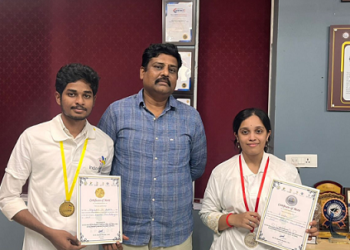Developing the foundational framework was one of the most important and challenging aspect under NEP 2020, as it has a huge bearing on shaping the future of our country.
The National Curriculum Framework (NCF) for the foundational stage released by Govt of India (GOI) last week provides a broad structure for learning from preschool to Class 2. Making learning an enjoyable experience by moving away from textbooks, and teaching in the home language, are important interventions. The real test will be in translating these ideas in schools.
Union Minister for Education and Skill Development, Dharmendra Pradhan launched the National Curriculum Framework for Foundational Stage and the pilot project of Balvatika 49 Kendriya Vidyalayas across the country.
Foundational, Preparatory, Middle & Secondary are the four stages of NCF for school education. Developing the foundational framework was one of the most important and challenging aspect under NEP 2020, as it has a huge bearing on shaping the future of our country.
The National Education Policy 2020 (NEP 2020) is transforming education in India. It has set our education system on a path to delivering the highest quality education for all, with equity and inclusion. Amongst the most transformative aspects of NEP 2020 is the new 5+3+3+4 curricular structure which integrates Early Childhood Care and Education for all children of ages 3 to 8. Early childhood lays the foundation for life-long learning and development – it is a key determinant of the quality of overall life. This framework is expected to deliver the highest quality Foundational Education, across all types of institutions in the country.
As articulated in NEP 2020, National Curriculum Framework for Foundational Stage, uses ‘play,’ at the core of the conceptual, operational, and transactional approaches to curriculum organization, pedagogy, time and content organization, and the overall experience of the child.
GoI must begin the process of ensuring infrastructure, manpower and support required for this shift. No textbooks, learning through play and interactions drawing on local communities and surroundings, use of mother tongue/home language, incorporating diversity, gender, moral and ethical awareness, and assessment through observation and analysing creativity are key elements of the framework.
Making learning more accessible through play and in a language familiar to children has the potential to retain larger numbers in classrooms.
This is particularly the case for first- and second-generation school-goers. Accessibility could help draw n parents into the process as well. Moving away from a textbook-bound system will provide the basis for critical and innovative thinking. The key to this effort will be the teachers. States must ensure there is no shortage. They will need material and infrastructure support to transform their classrooms to innovate and experiment.
The NCF 2022 for the foundational years is a 350-odd page document. It must not become the new textbook that circumscribes teaching. Schools and teachers must innovate and make changes to cater to the needs of their learning communities.
Done properly, it could very well spawn a new generation of minds.
Buy a book on NEP























